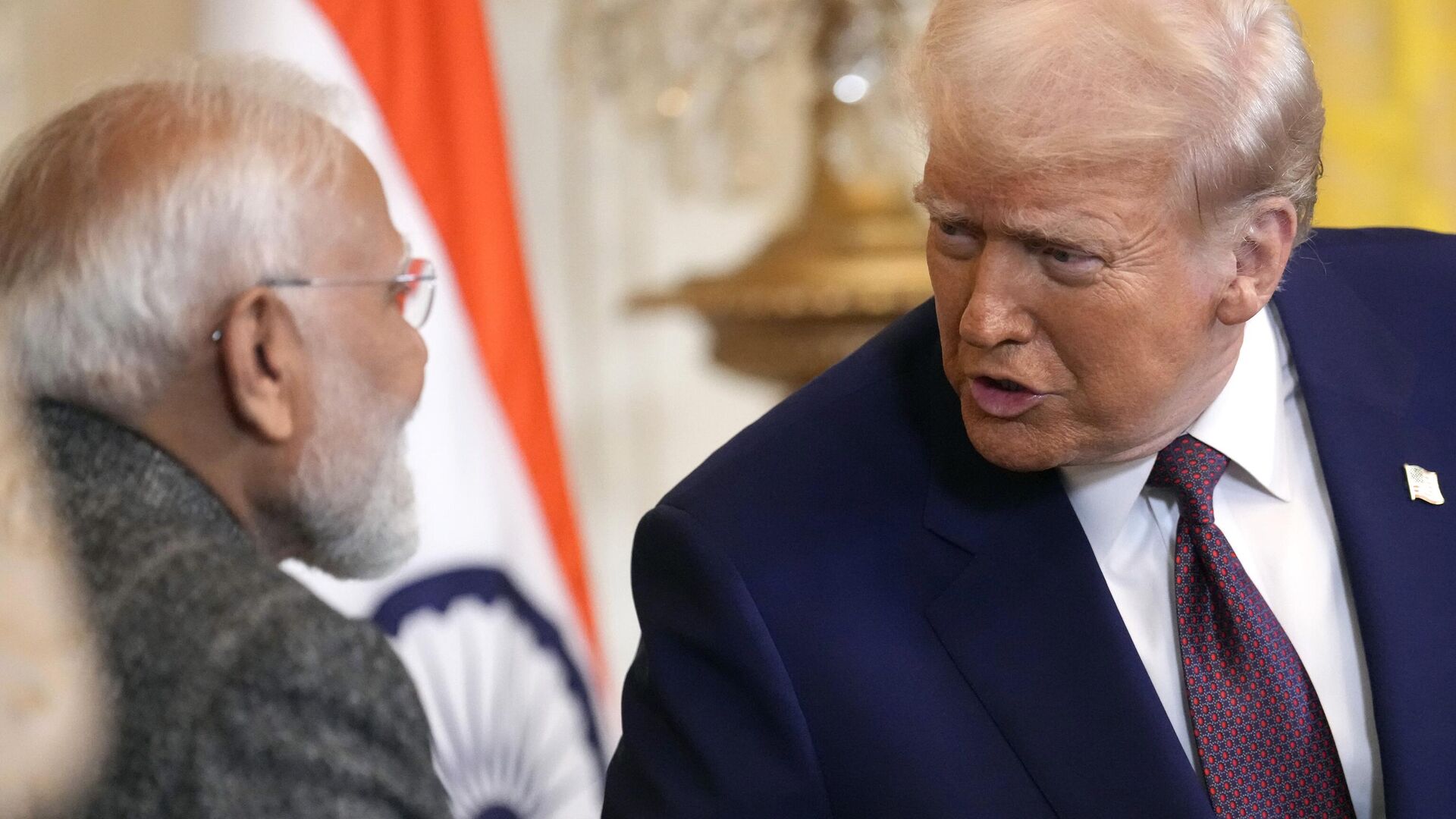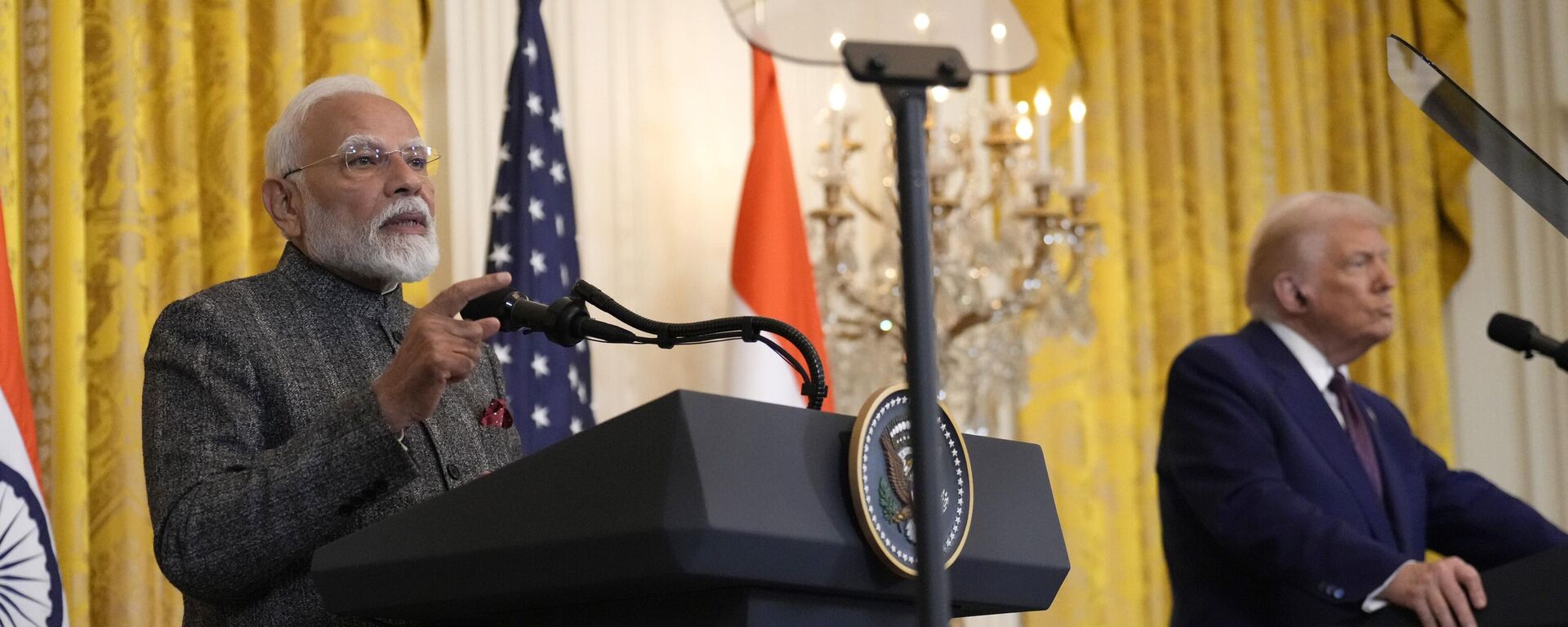Trump Tariffs: Why US Needs India More For Its Global Influence & Economic Growth?
19:42 31.07.2025 (Updated: 19:43 31.07.2025)

© AP Photo / Ben Curtis
Subscribe
Since Wednesday, when US President Donald Trump imposed a 25% tariff on a wide range of Indian exports, the American leader has gone on a rant, criticising India's trade barriers, its economic and defence ties with Russia, and its close cooperation with BRICS nations.
In a series of social media posts, US President Donald Trump has labelled India as the "Tariff King", repeatedly arguing that the world's largest democracy maintains "the highest tariffs in the world".
But the record of Trump's own country is not so bright in this regard, with America enforcing some of the highest duties on certain products in the world.
For example, the World Trade Organization (WTO) reports that the US charges 350% duty on tobacco items, more than 200% on dairy, and over 130% on cereals, vegetables, and fruits.
Hence, Trump's accusations reek of double standards, wherein he accuses New Delhi of being the world's highest tariff enforcer while ignoring the steep tariffs his country imposes.
While India is often criticised for having one of the highest average tariff rates in the world, it is important to note that the United States also heavily protects its own agricultural sector, underscores Dr. Prerna Prabhakar, an Economist and Associate Fellow at the New Delhi-based financial think tank Centre for Social and Economic Progress (CSEP).
However, the real concern for the US is not just tariffs, but India's rising trade surplus with the US and the increasing use of non-tariff measures, particularly in the form of Quality Control Orders (QCOs) by India. These QCOs, while intended to improve product standards and safety, are often seen by US exporters as non-transparent, burdensome, and restrictive to market access. They argue that these measures create barriers to entry for foreign goods and delay supply chain integration, she added.
"While the trade relationship with the United States is important, India should not get fixated on purely transactional negotiations. Instead, it must focus on the broader strategic picture — one that aligns trade policy with long-term goals of industrial competitiveness, technological upgrading, and global value chain integration," Prabhakar told Sputnik India.
The think tanker suggested that India should take some steps in the wake of Trump's announcement:
Rationalise Tariffs on Critical Inputs and Intermediates
India should consider lowering tariffs specifically on critical inputs and intermediate goods, especially those that feed into key manufacturing sectors like electronics, automobiles, and textiles. This will reduce production costs, enhance global value chain (GVC) integration, and make Indian manufacturing more attractive for foreign investment, the expert stressed.
Reevaluate Quality Control Orders (QCOs)
"While QCOs serve a legitimate purpose in ensuring product safety and consumer protection, their proliferation and design need careful review. India should assess the number of QCOs being introduced and evaluate whether they disproportionately impact importers and delay access to essential inputs. There is scope to align QCOs with international standards (e.g., ISO/IEC) and accept ILAC-accredited international test results to facilitate hassle-free compliance," Prabhakar underscored.
Meanwhile, Tufail Bakshi, the author of the social media page Military Cognizance, which has 116K followers, reckons that the United States needs India more than ever as a key ally/partner due to multiple reasons, but "more so for its Indo-Pacific strategy and as a counterweight to China, which is challenging the US dominance not only in the military domain but in economic terms as well."
"Moreover, India, with its 1.4 billion population, is a huge market for American companies that are now looking to shift their base from China. Case in point is Apple Inc.'s decision to move its production facility to India. Just a few days ago, India overtook China in smartphone exports to the US. Furthermore, Tesla opened its maiden showroom in India earlier this month. All these developments point toward a positive trajectory for US businesses in India," Bakshi said in an interview with Sputnik India.
Besides, India is America's link to the Global South, and a main figure in making sure there are strong supply chains not ruled by China, he continued.
Over and above the 25 percent tariffs, Trump imposed an additional penalty on India for its business relations with Russia. Subsequently, the billionaire businessman-turned-politician called the economies of Russia and India "dead".
"I don't care what India does with Russia. They can take their dead economies down together, for all I care. We have done very little business with India, their tariffs are too high, among the highest in the world. Likewise, Russia and the USA do almost no business together. Let's keep it that way," he wrote on his social media network, Truth Social.
Trump's jab at India and Russia came after months of American pressure on India to sever its ties with Russia, which the former rebuffed on multiple occasions.
For the unversed, Russia has been India's top energy supplier, contributing over 35 percent to India's crude basket for almost three years. What's more, the Indian armed forces are heavily reliant on Russian equipment, with the Eurasian state's weapons platforms like the S-400 air defence system even playing a key role in the country's recent military campaign against Pakistan earlier this year.
"Furthermore, India doesn't want to be part of a particular bloc - East or West, rather it wants to maintain its strategic autonomy, focusing and working on what's best for its people, economy, and security, something that is not in line with the US strategy to maintain its hegemony in the world," Bakshi underscored.
India's relations with Russia are historic and strategic, and based on mutual trust that has been nurtured through decades of cooperation between the two long-time friends. Unlike the US, Russia has been a reliable partner for India, particularly in defence, where it has always been welcoming in sharing critical military technology, he explained.
If it weren't for Russia, India would have not had such a successful missile programme. The BrahMos missile is a live example of Russo-India cooperation. Among other successful initiatives are the Indo-Russian Rifles Private Limited (IRRPL), which has virtually solved India's problem of not having a world-class assault rifle for its soldiers, the military analyst noted.
"On the other hand, crude oil purchases from Russia have helped India to keep inflation in check, helping ease the prices of essential commodities. This has led the central bank to reduce interest rates, allowing banks to pass on the benefits to consumers, especially to the nation's middle class," Bakshi asserted.
This isn't back-stabbing the West — it's about what India needs. The hard truth for the US is this: India won't choose sides. It's not the Cold War era now. The more the US tries to push or talk down India, the more it risks pushing away one of the few big powers still open to working well with both East & West, he observed.
Thus, India makes its own choices, and if the US wants a strong bond, it has to stop seeing India as a new joiner & start seeing it as an equal. Undoubtedly, India is a truly free force in a world with many powerful players, and the more the US wants India to follow its lead, the clearer it is that the US needs India's help more than India needs its, the expert summed up.
Notably, opposition politician and India's former junior Foreign Minister Shashi Tharoor called Trump's actions "unreasonable" before ripping the US administration for attempts to destroy the South Asian nation's trade.
"He had specified a penalty for our buying oil and gas from Russia. It could take up to 35% or 45%, we don't know how much. If you are going to talk about 100% penalty, then you are going to destroy our trade. It may be just a bargaining tactic, as you know the trade negotiations are still going on. And therefore, there is a possibility that in the course of negotiations, this may come up. If it doesn't, it will certainly damage (trade)," Tharoor told reporters outside Parliament on Thursday.
The parliamentarian exhorted Indian negotiators to resist the US tactics; otherwise, it would put the livelihood of its farmers at stake.
"For example, we have about 700 million Indians who are dependent on agriculture. We cannot risk their livelihood to make America happy. America has to understand our needs as well," he concluded.


